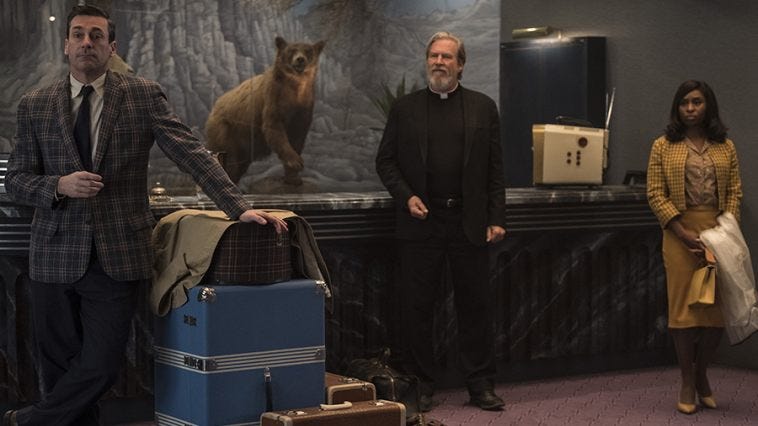Bad Times at the El Royale

It was clear from trailers that Drew Goddard's Bad Times at the El Royale would be packed full of vibrant style, mysterious intrigue, and pulpy violence. What naturally wasn't revealed in those trailers was what all that would be building toward; therein lies the fun of going to see a crime caper like this one. Unfortunately, for all its colorful characters, sexy photography and editing, and gut-thumping action, I'm not sure the movie itself ever revealed what all that was building toward either.
Now don't get me wrong; I'm often a proponent of the "it's about the journey" defense of movies. Hell, it's an obvious and easy justification for most of the Marvel Studios films (which—as anyone who knows me would tell you—I will die defending as valuable pieces of pop culture and, yes, art), whose outcomes can almost always be predicted. But the defense doesn't hold up for me with El Royale because it doesn't make the journey count where it needs to in order to *just* be about the journey. Sure, the characters are colorful and distinct—and a few of them have their moments of humanity and empathy—but none are delved into with any degree of unexpected sincerity or consequence, save for maybe Cynthia Erivo's steadfast soul singer Darlene Sweet. The others are essentially caricatures, which would be fine, except that the camera periodically hangs on them long enough to give the impression that the film wants them to be more. Additionally, the focused, slow-burn mystery plot structure feels like a deliberate attempt to make you feel like it's *not* just about the journey, further compounding that feeling of dissatisfaction when the finale winds up a sort-of, "Well, I guess that is an ending."
To boil it down: the issue seems to be that El Royale tries to be the movie that unravels some connective or all-encompassing narrative that pulls everything together, as well as aiming for the kind of movie that is ultimately "about nothing." It's fine that it wanted to deceptively set up the expectation that it'd be the former, but its twists, turns, and final resolution aren't engaging enough, nor its characters charismatic enough, to pull off the latter, and it lacks the meta-narrative about separate perspectives that a film like Pulp Fiction uses to make you feel the irony of the "circumstance" that puts it all in motion. The resolution is also a tad ham-fisted and safe for a film that seems to be all about subverting classic story progression.
That said (and I probably should have led with this), there is plenty to like about El Royale. The acting across the board is solid at its worst and provocatively charming when it hits its stride. With a cast consisting of Jeff Bridges, Jon Hamm, Dakota Johnson, and Chris Hemsworth, all of them playing varying degrees of scumbags, it was bound to be fun, if nothing else. The characters get some amusing and humanizing scenes of banter and introspection to encourage you to stick with and root for them, even if those revelations ultimately don't really end up paying off for anything. As noted earlier, the editing, cinematography, and set design are also on point, throwing the neon-modernist, retrofuture aesthetic of the 60s in a blender with 80s action movie hyperviolence and grit to create a perversely pretty visual language.
El Royale is an easy film to have a good time with for casual moviegoers and film nuts alike. The blend of mystery, comedy, and nail-biting tension makes for an enjoyable experience. It's like an auteur popcorn flick, in many ways. While the confused message and storytelling on top of a rather plain resolution may prevent this one from sticking with you or encouraging repeat viewings, the cast, dialogue, and cosmetic stylings should be enough to leave you glad you made the journey.



